
“The United States covers an immense territory, the individual states are separated from each other by great distances, and the population is disseminated over the surface of a country which is still half a wilderness. If the Union were to undertake to enforce by arms the allegiance of the federated states, it would be in a position very analogous to that of England at the time of the War of Independence.” – Alexis de Toqueville, Democracy in America
When you first watch Eric Kripke’s Revolution it’s hard not to read it as technophobic. His vision proposes that in the absence of the gadgets and paraphernalia of contemporary life we devolve into nation-states that war with each other over unspecified reasons. A certain kind of madness takes hold in this world – the madness of power, the madness of survival, the madness of abandonment. And yes, this show tells a story of abandonment. The government is no more. Parents leave and/or die. All the things we depend on for comfort and security become unreliable and unstable. Kripke’s landscape critiques our world by turning the “lights” off, and in one way, the “lights” become a metaphor for the thin line between the uses and luxuries of technology. The lights are both womb and blindfold.
But there is hope in loss of technology, in this contemporary technophobic apocalypse – the hope is in the concept of family, of relationships, of reconnecting by disconnecting. Humanity is not being human; it’s remembering to be humane.
The Lights are a Metaphor – Revolution’s Sentimental Criticism of American Culture

“The United States covers an immense territory, the individual states are separated from each other by great distances, and the population is disseminated over the surface of a country which is still half a wilderness. If the Union were to undertake to enforce by arms the allegiance of the federated states, it would be in a position very analogous to that of England at the time of the War of Independence.” – Alexis de Toqueville, Democracy in America
When you first watch Eric Kripke’s Revolution it’s hard not to read it as technophobic. His vision proposes that in the absence of the gadgets and paraphernalia of contemporary life we devolve into nation-states that war with each other over unspecified reasons. A certain kind of madness takes hold in this world – the madness of power, the madness of survival, the madness of abandonment. And yes, this show tells a story of abandonment. The government is no more. Parents leave and/or die. All the things we depend on for comfort and security become unreliable and unstable. Kripke’s landscape critiques our world by turning the “lights” off, and in one way, the “lights” become a metaphor for the thin line between the uses and luxuries of technology. The lights are both womb and blindfold.
But there is hope in loss of technology, in this contemporary technophobic apocalypse – the hope is in the concept of family, of relationships, of reconnecting by disconnecting. Humanity is not being human; it’s remembering to be humane.
Flickering Bulbs: A World on the Brink
“Do you understand the sadness of geography?” – Michael Ondaatje, The English Patient
“Into this world we’re thrown/like a dog without a bone” – The Doors, “Riders on the Storm”


The pessimism of Revolution is apparent in its flashbacks. While the show starts 15 years after the blackout, it intersperses narrative timeframes to fill in the backstory of what happened between then and now. The immediate aftermath, the first year shall we say, seems extraordinarily apocalyptic, almost too much so. One would assume that the structures and systems are in place to prevent a consumptive anarchy, but the story we see is one of abandonment. Roads are empty. Crime is rampant. Looting becomes a sort of sanctioned scavenging. Lawlessness is the new social contract. But the immediacy of it might suggest that lawlessness was already the social contract and that by turning the lights off, the show illuminated the corruption and chaos that was already present.

In the episode “Children’s Crusade,” we learn that the blackout originated with the environmentalist idealism of Ben and Rachel Matheson – they were trying to develop a technology that would conserve energy, make the world a “greener” place where we use more for less – the ultimate American technological dream. The irony is blatant, of course – this show capitalizes on a “be careful what you wish” theme in many of its stories, but the interesting subtext and one that the story struggles to tell is that the blackout eventually occurs because of the birth of one son and the death of another son. By saving Danny, Ben and Rachel collude with the US government, as represented by Randall, and inevitably give him the weapon to punish the world for the loss of his own son.
The simplest economy in life – everything costs. We cannot have more for less. Resources re-distribute; they are not created. And the show revisits this theme in almost every story thread. In order to redeem Miles, the story must show Monroe’s descent into madness. One son dies, Danny, while another lives, Jason. One republic prospers while another struggles to survive. It’s also a structural component of the show; with too many characters on the landscape, the show has had to decide on which characters deserve the narrative resources and which do not. Everything costs, even the text itself. Abandonment is a type of economy.
The lights protect us from the dark, or so we think. But really the lights being turned off reveal how humanity, left on its own, will resort to adapting other technologies to serve self-interest, or at least seeming self-interest, which segues nicely into another not-so-subtle critique the show indulges in: capitalism without morality.
Capital Projects
“The profits which accrue from membership in a group are the basis of the solidarity which makes them possible.” – Pierre Bourdieu, “Forms of Capital”
“It was just because we were in their way. They killed us to suit themselves.” – Richard Adams, Watership Down

Captain Tom Neville’s character represents a particularly American brand of self-interest and greed that pre-dated the blackout. In “No Quarter” we are shown Neville’s reading habits, which include the autobiography of Lee Iacocca, one of the pre-eminent figures of 1980s capitalism, the era of Wall Street. Kripke dates his criticism here, reminding us of the 1980s race for the top that idealized the individual accumulator of wealth over the group. Neville’s own backstory provides a nice un-packaging of the victim turned victimizer, that he was himself the weak link in the rusty chain that was American corporate greed. His anonymity as an insurance salesman, though, becomes the capital with which he accumulates his wealth, an intellectually and morally devious endeavor. In the pilot episode, Neville presents his history as strength even though later on in “Soul Train” we will see him in a subordinate position before the blackout. His repressed rage unleashes on the world in a gruesome murder scene only several weeks after the blackout.
Again, the first year of the post-blackout world reveals major moral turning points in characters. Three main characters – Neville, Miles, and Rachel – all commit murder in the name of survival and perhaps justice as well. But Neville’s rage is unique, as it empowers him in a way that makes sense of the character he has become in the near generation since the lights went out. The once doting father now is coldly cruel to both his son and Danny, Rachel’s son. He perceives frailty in the young, the idealistic. One can suppose his rage is self-directed and is transferred onto the physically or politically weaker. His amoral capitalism comes to a head in his coup over the militia and his showdown with Monroe during the two-part season finale. Having a general in his grasp allows Neville to be truthful, but his truth is calculated weaponry. He comes to power, finally, moving up through the ranks much like Iacocca did at Ford, but for Neville, the expense of that journey was his humanity.
A light went out in him and never turned back on.
Mother Earth and Father Time
“The ghost of electricity howls in the bones of her face” – Bob Dylan, “Visions of Johanna”
“Don’t write about Man; write about a man.” – E.B. White, Charlotte’s Web

Rachel Matheson emerges as the most dangerous warrior/general on Revolution. She understands the costs of this new world because she recognizes her part in its development. In fact I would argue that she is a kind of mirror to Tom Neville. Her calculating strategies alongside her stoic (sometimes seemingly impersonal) affection for her daughter, Charlie, set her as the opposing force to Neville’s immoral entrepreneurship. Both characters are motivated by revenge – Neville’s revenge against a world that victimized him; Rachel’s revenge against a world that made her one success, Danny’s life, into another one of her many failures.
Yet Rachel turns toward self-righteousness instead of selfishness. She identifies a cause for her actions – the cause of power equilibrium, which is ironic given that in science, equilibrium is balance and both she and Ben were trying to create a technology that was unbalanced. In “The Song Remains the Same,” Rachel decides to make her way to the “Tower” to turn the power on. When Miles resists she tells him, “The bad guys have it. The good guys need it too.” While before she had refused to give both Miles and Monroe the secret to turning on the power, Rachel now wants to give everyone the power, in hopes that it will lead to Sebastian Monroe’s obliteration.
The show uses the Mathesons as a technology. The story of Ben, Rachel, and Miles explores how civilian technological idealism, such as environmentalism, can be co-opted by an institution like the government and what that marriage looks like in the starkness of dawn’s early light. A side note here: Watch the names carefully on this show – Neville, Matheson, Monroe – they are all Anglicized names, which is a nice and subtle tip of the hat to the American war of independence from Britain. Where Ben and Rachel represent the civilian turned unwilling military partner, Miles represents what happens to the military believers who are left behind. Both Monroe and Miles are remnants of the old world order, and like the rest of the nation, they too are abandoned to fend for themselves. But unlike Rachel and Ben, who try to scurry into obscurity and a nostalgic agrarianism, Miles and Monroe walk right into the heart of the urban blight where guerilla warfare appears to take hold and where the American way of life disintegrates in a matter of weeks.
However, it is in the story of Miles and Monroe that we start to see one emotional core of the story that Revolution is telling. Humanity, at least in this first season run, distills down to the difference between dependency and co-dependency.
There is a Light and It Never Goes Out
“To die by your side/Well, the pleasure – the privilege is mine” – The Smiths, “There is a Light that Never Goes Out”
“We turned at a dozen paces, for love is a duel, and looked at each other for the last time.” – Jack Kerouac, On the Road

I would have to agree with Tom Neville. The story of Miles Matheson and Sebastian Monroe does border on the erotic and co-dependent; however, the story is more than that. It’s the story of brothers in arms. Traditionally the brothers-in-arms story is one about war, but it can be also one of trauma and survival. The backstory of Miles and Monroe is one of the show’s keystone narratives for a number of reasons. First, since the evil empire that the protagonists struggle against is the Monroe Republic, we as viewers needed to understand how that came into being. And it came into being through Miles, through a single act of vigilante justice against road side criminals. In the absence of law Miles creates the law and Monroe follows, which defines his nature.
In a weird way, the relationship is brotherhood but also discipleship and a warning to beware of turning brothers into messiahs and generals into gods. For Monroe, Miles comes to represent family, and in his psychology, Monroe makes family into a kind of god, one that excuses his behavior, as seen in the season finale when he kills the wife and kids of the rebel who bombed the bar where Miles was celebrating his birthday with Monroe. Monroe grows to depend on Miles early on, as shown in their flashbacks, specifically in “Nobody’s Fault but Mine,” the mid-season finale. The graveside scene between Miles and Monroe gives us context to the first scenes in “No Quarter” when Monroe insists that Miles is family and that he will follow him to Chicago. We learn that Monroe’s family was killed in a car accident and that Miles saves him from suicide. This scene explains, to a degree, how Monroe comes to depend on Miles for emotional stability, and when Miles abandons Monroe, both through attempted assassination and actual desertion, the world Monroe relied on became another post-apocalyptic scene.
For the show to redeem Miles, then, it had to revisit the relationship between the two men. We see that Miles is a deserter. Rachel implies this reading when she tells him to take care of Charlie before she leaves for the Tower, that he must take “better care of her [Charlie] than you ever took of me.” A later implication is that Charlie may, in fact, be Miles’s child. Miles deserts and we know this fact from the pilot. But the cost of abandoning Monroe is way too high. Because his dependence is so complete, Monroe’s anger at being left behind threatens to scorch the earth, literally. The fight between two men becomes the battle field, a war of brother against brother, an uncivil domestic war. So both Miles and Monroe must be placed on the road to redemption for the core political story to make sense – to destroy the militia’s foundation. Miles must return to his crimes and if he can’t rectify them, at least like Rachel, recognize his part in them while Monroe must be goaded, as he was in the season finale, to run toward independence and away from the one relationship that made him but also destroyed him. He has to run toward fatherhood and away from adolescent self-indulgence just as Miles has to admit to being a flawed father and a failed god-general. It is the most human and most American story in Kripke’s landscape.
Dark Matters
“The silent colossal National Lie that is the support and confederate of all the tyrannies and shams and inequalities and unfairnesses that afflict the peoples — that is the one to throw bricks and sermons at.” – Mark Twain

As the season closed, Revolution brought us back to the underlying mythos of the plot – the disintegration of the government in the face of the blackout, an event caused by the government. Just as Miles and Monroe and Rachel and Neville all must face and answer for their part in the events that have transpired, so too does this entity. The irony of the seat of the US government being relegated to Guantanamo Bay is not subtle and it is with foreboding that I look toward its return in season two. What is this creature that will be coming home? Is it the monster we created or the salvation we seek? Both? Neither? Whatever it is, the next season promises to delve further into the show’s historical panorama. And I suspect that the world before the blackout was a dark place indeed.
I’d like to end by saying that I anticipated the beginning of Revolution for a few reasons. First, I’m fan of Eric Kripke and JJ Abrams, although the former is a more important American storyteller to my mind, at least on television. Second, I love post-apocalyptic narratives. But finally I really wanted to see a show challenge the concept of power and what it means to be powerful. This show has done so with the most eloquent and elegant of metaphors – electricity. And while the wide ranging institutions of American society seem to be a point of critique for the show, I find that hope is its centerpiece story. The hope is in the characters and their growth. Progress is not about how fast you get to the finish line or how high you build the skyscraper. Progress is knowing that you can regress and still survive. Granted the show had its weaknesses and inconsistencies in the first season, but I would challenge you to watch it not so much for what it’s saying but how it’s saying it. The lights are not the end. They are the metaphor for the end.


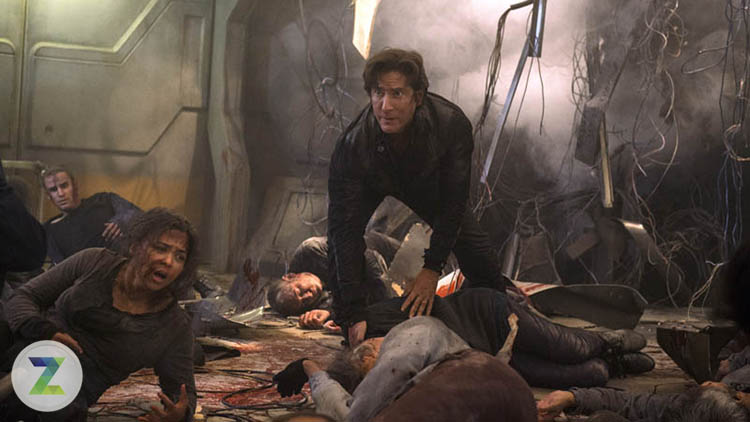
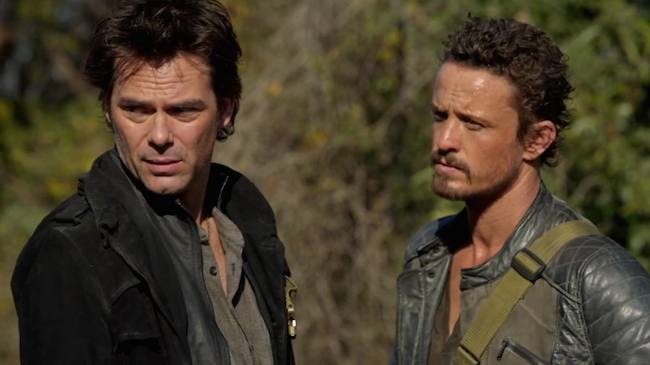
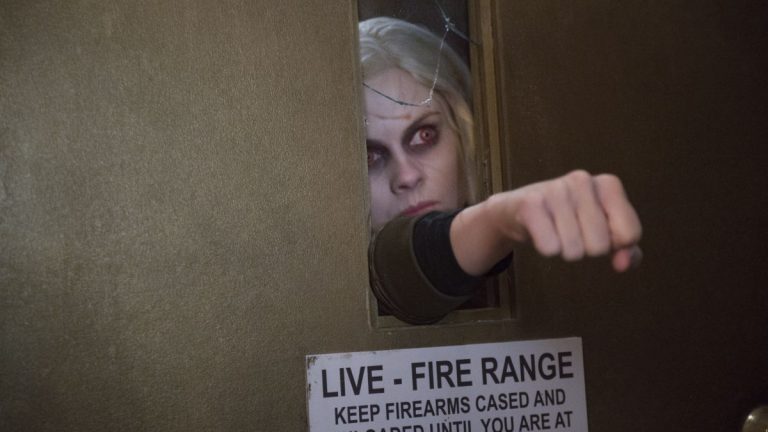
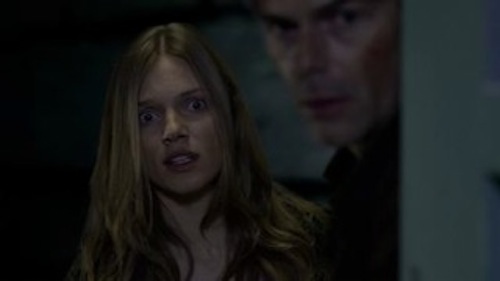
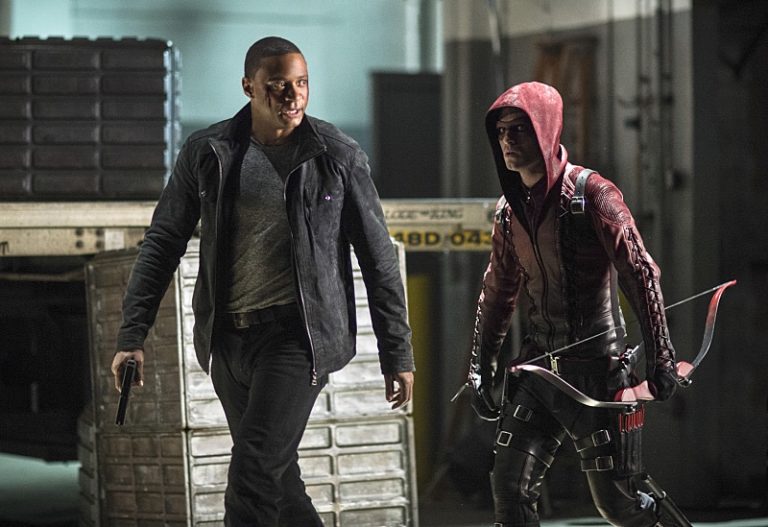
Linda,
This is a lovely look at how Revolution tells the story and why it tells the story. I think that’s why, despite some of its flaws, that I’ve stuck around. The concept that power is so rooted with in our culture at this stage and that if it were to disappear tomorrow would knock over the apple cart is an interesting concept and it does make us have to think—which means it is doing something right.
I love how you connected all of this to light and American history, which I think is a big power for this show and could become even more in season 2. I also wonder what the exiled United States Govt will be like in its return, and what type of response it will have to the changed landscape in its absence.
Great job here!
Nice Linda! You say it in such an eloquent, erudite way! I say snippets of it here and there when I go through each ep, but the way you really summed it up in the different themes is wonderful. I definitely agree–sure there are flaws, there always are, but there is a message worth listening to.
I think about Miles and Monroe I would comment that I feel Miles is as much to blame for Monroe’s co-dependence as Monroe allowing himself to “deitize” Miles. My personal feeling from the interchanges we have seen about Miles and Ben and their apparent issues (like what Rachel said to Miles about them essentially disowning Miles, also Aaron admitting that all Ben ever said about his brother was that he was “good at killing things”) I get the feeling that Miles thrived of of Bass’s apparent worship of him. Looking at what Bass remembered about one of Miles’ birthdays–guys girls and crazy times–versus what memory of Bass’s birthday Miles decided to remember–an embarrassing experience of Bass’s where he got a little over aggressive playing dodgeball and gave one of the other boys a concussion and had a horrible flavored cake–I think we can see how Miles saw where he stood in the relationship and that he was happy with this…Maybe for Miles, he sees this as the brotherly relationship that he has the power in, versus that with his brother, where he doesn’t seem to…interesting how he slept with his brother’s woman and Bass slept with his…Miles claimed that Bass meant nothing to him (midseason) like Rachel told Miles that she and Ben wanted nothing to do with him… the relationships between Bass and Miles and Miles and Ben seem to have some striking similarities…
on another note, I was reading the second draft of the pilot and apparently Miles in that version was only a lance corporal in the marines and Bass was a staff sergeant–so several paygrades higher than Miles. I’m wondering if the move to each being sergeant was because they took Billy and moved him from Bass to Miles and then with hiring Dave, who is younger than Billy by ten years they decided to make them the same rank. the initial telling would have made more sense with the eventual Bass being General, but it wouldn’t have made any sense with casting as it wound up…I just found that to be an interesting observation, in an observationally interesting way…
I wonder what will happen with the power now in Season 2. will they have a new tagline? will the power go out again? I wonder if the premise is frustrated with the power on, because the premise as we know it starts with “in a world without power…” when if we are using that strictly metaphorically, there is too much power…and not with people that will use it wisely…